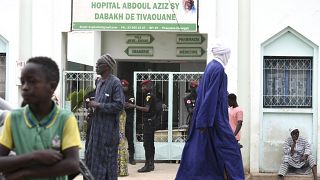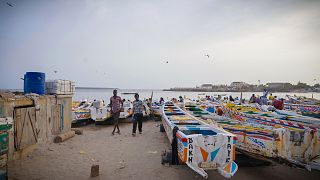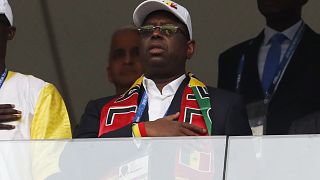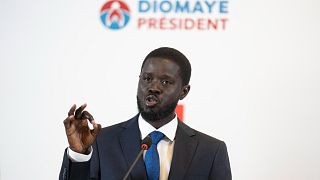Senegal
President Macky Sall on Friday ordered an audit of Senegal's neonatal services after the death of 11 newborns in a hospital fire sparked fresh grief and indignation over the country's health system.
The blaze in a neonatal ward in the western city of Tivaouane, weeks after the tragic death of a mother-to-be, has turned a spotlight on flaws and funding problems and triggered calls for senior-level sanctions.
Sall on Thursday fired his health minister, Abdoulaye Diouf Sarr, replacing him with the former director-general of the public health authority, Marie Khemesse Ngom Ndiaye.
But for many Senegalese, that is not enough. They have demanded more action, fearing Wednesday's fire will not be the last.
After cutting short a trip abroad and visiting the Tivaouane hospital room where the babies died, a visibly emotional Sall said the health system was obsolete and ordered a nationwide audit of neonatal services.
A "modernisation effort" would look at what was not working so that hospitals would no longer be "a space of despair or tragedy", he added, vowing: "Never again".
He said he would meet the families of the dead babies later in the evening.
In April 2021, four newborns died in a hospital fire in the northern town of Linguere. The mayor blamed an electrical malfunction.
Last month, a heavily pregnant woman died in agony after her appeals to be given a Caesarean at a public hospital in the northwestern town of Louga were denied.
Three midwives were sentenced to six months' suspended imprisonment as public outrage rocked the country.
Details behind the fire at Tivaouane's Mame Abdou Aziz Sy Dabakh public hospital remain sketchy.
The new neonatal ward was inaugurated just last year.
Sarr and mayor Demba Diop said the blaze was caused by a short circuit, and staff blacked out and were unable to save the babies.
But Serigne Cheikh Tidiane Sy Al Amine, a local religious figure, said the hospital had been plagued for 15 years by "donations of obsolete equipment and broken promises to build a new hospital".
Private health services are expensive in Senegal, and many residents of Tivaouane and its surrounding areas must choose between the hospital or traditional medicine.
- 'Never again' -
Calls for sanctions abound on social media, with many tweeting "Never again."
"We have qualified doctors, but... if we do not create the conditions for them to practise, there is no point in dismissing a minister to replace him with another who will end up facing the same problems," said Nina Penda Faye, spokeswoman for a campaign group called Patients in Danger. -
President Sall has declared three days of national mourning, and festive activities such as those of the Dakar Biennial of Contemporary Art have been suspended.
The judicial unit leading an investigation into the incident said it would be "ruthless" towards those responsible.
Senegal, widely seen a stable democracy in a turbulent region, is considered to have superior healthcare to many other African countries.
But there is a significant gap in the quality of service between large towns, smaller settlements and rural areas.
A 2019-2028 plan drawn up by the health ministry acknowledged shortcomings despite efforts made in recent years.
It highlighted lack of staff and equipment in health centres -- widely used facilities that are a midpoint between rural health posts and urban hospitals.
"Sixty-seven percent of the operating theatres set up in health centres are non-functional (including 59 percent due to lack of equipment and human resources)," it said, describing the maintenance of devices as "inefficient".
- 'Up to divine will' -
At Tivaouane hospital, the mood among many patients on Friday was of sadness mingled with resignation.
"What happened is very hard," said Mbene Souare, a woman aged in her 40s who had come from the neighbouring village of Pire for treatment.
She admitted that the hospital would not have been her first choice given the tragedy, but said she had no other option.
"We pray to God that this will not happen again," she said.
Mohamed Camara, 24, said he was worried about coming to the hospital.
"But I can't not come here," he said, as he stepped out of the building holding an X-ray.
"I leave it up to divine will."











01:40
‘The Herds’ puppets highlight climate change in Lagos
04:22
African nations shine at Special Olympics Winter Games
04:13
The fight for justice: Amnesty International on Senegal's protest crisis
Go to video
Senegal signs historic peace deal with Casamance separatists
11:02
Senegal’s Debt and Deficit: A Harsh Economic Reality [Business Africa]
00:53
Senegal to aid families of protest victims